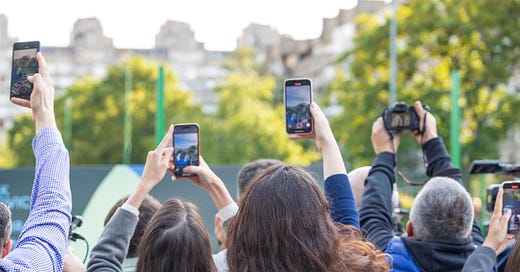Last year, a young man was arrested during New Orleans’s Carnival Festival. Medium build, shirt torn at the collar, he stood, cuffed, chest to chest with a police officer. A tense conversation enveloped them, while somehow not appearing dangerous. Then something shifted. The police officer, later identified as the young man’s uncle, appeared to speak words that broke his nephew’s stoic demeanor. By the end of the exchange, the young man was crying in his uncle’s arms, revealing that this was not a police-civilian exchange, but a loving elder supporting a wayward son.
Tears welled up in my eyes, and I was emotionally moved as if I were there to witness the event. I was not. I was one of the millions of people captivated by this intimate and subsequently viral moment, recorded by a bystander.
You might think that sharing more images of men being vulnerable is a good thing, and often, it is. If men aren’t consenting to having their most intimate moments broadcast to the world, are we actually supporting them? Or are we creating a different kind of problem?
I love seeing men exhibit vulnerability. I find beauty in moments where men allow themselves to be soft, open, and moved. I watch YouTube clips and TikTok highlights that show men surprised by emotion which are often the usual places, such as graduations, weddings, and reunions. Yet, something about it doesn’t sit right with me. In most of these cases, the men didn’t record or share the footage themselves. Their emotional release becomes content, packaged and consumed by others. Their most human moments turn into an inspiration that feels stolen.
This raises a complicated question: Should men’s emotional expression come at the cost of their consent? To understand the weight of that vulnerability, we need to examine the pressures men face in the first place.
Men work hard to maintain the veneer of masculinity that serves them throughout their lives. That stoicism allows men to navigate the various roles they’re expected to play: provider, protector, stabilizer. So when a man does cry, it’s often the result of years, if not a lifetime, of internal tension. It’s deeply relieving, not only for the man experiencing it, but all the people who understand his silent burden. In today’s world, even those private moments of relief are rarely ours to control. They’re documented, shared, and framed by others.
Of course there are socially sanctioned moments for male emotion. In those cases, tears are “allowed.” What happens when a man cries while having a raw emotional moment and it is recorded by someone else? What happens when that video becomes a message about masculinity, without the man ever being asked how he feels about it?
I worry that one day someone will record me crying without my consent and upload it online. As much as I enjoy watching these videos, I assume there are others who feel the same way.
Too often, these moments are shared to center someone else besides the person who experienced it. A proud partner, a tearful parent, a stranger behind a smartphone. The man’s raw vulnerability becomes evidence of someone else’s virtue, someone else’s impact, someone else’s narrative. It’s no longer his.
A beautiful moment of softness becomes just another role he must perform. His emotion becomes a spectacle. A symbol. A teaching tool. A meme.
I get why people feel justified in sharing these moments online. Everyone benefits when men break the veneer of social scripts imposed upon them. Public displays of male vulnerability are necessary to normalize emotional expression. I believe this should happen. It is the how that needs more interrogation. People want to share their experiences with the world, hoping that someone else will benefit, and many do.
Even when it comes from a good place, sharing without consent can have a chilling effect. If a man knows that crying will make him famous on TikTok, that his tears will be edited, captioned, and posted, it becomes another reason to stay silent. He has one more reason to hold it in.
We say we want men to feel more, but do we want them to feel for us, or for themselves?
Real liberation means giving men agency over when and how their emotions are shared. It means letting men narrate their own stories. Not every tear needs an audience. Not every breakdown needs a backstory. Every moment of male vulnerability does not need to be converted into a message.
I think we’re moving in the right direction. There’s more space today for men to be emotionally expressive than ever before. Prominent men, ranging from Prince Harry of the British Royal Family, to billionaire mogul Jay Z, have joined the cultural shift in de-stigmatizing open discussions of men’s vulnerability. All forms of media, from podcast to television shows, have expanded the range of acceptable male behavior. Instagram and TikTok are now filled with positive examples of male emotionality. At the same time, consent matters. If we want men to show their full emotional range, we must also allow them to decide when and if they want to.
So the next time a man you know is having a deeply personal moment, put the camera down. Let him feel what he’s feeling. Honor the lifetime it may have taken him to get there.
As powerful as it is to witness a man break open emotionally, it’s even more powerful to let him decide what the world gets to see.
Liked this piece?
I’m Martin Henson, writer, activist, and public speaker
Website: https://linktr.ee/martinhspeaks | Follow: Bluesky | Support: Buy me a Coffee]
✊🏾 Let’s build together.






Beautiful piece. I appreciate and honor every single instance where a man is vulnerable. It warms my heart. I grew up with a father who would cry often and that makes a big difference in the way that others perceive men's vulnerability.n